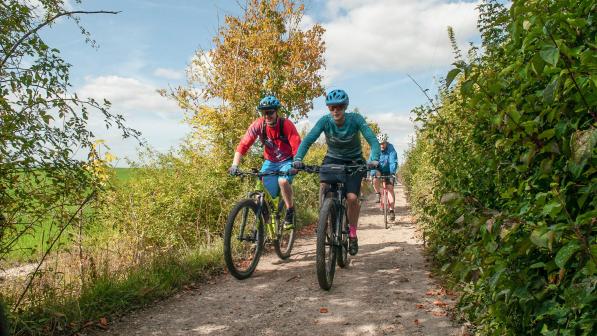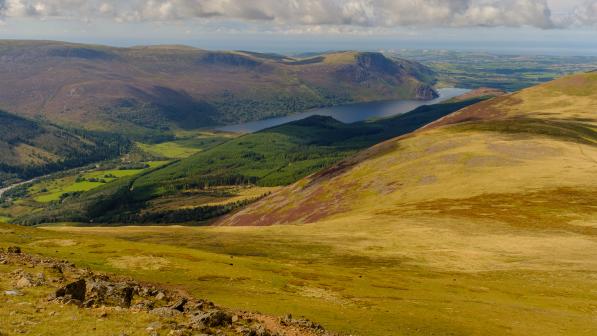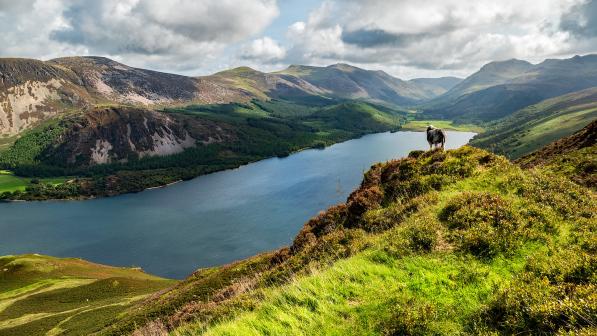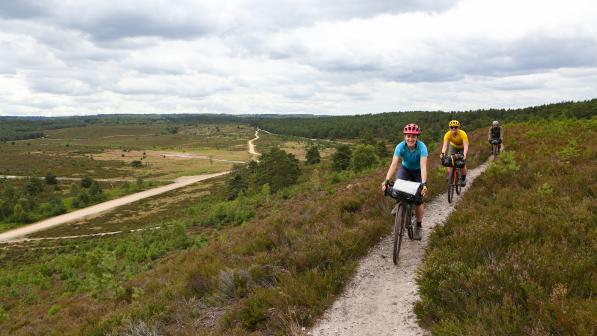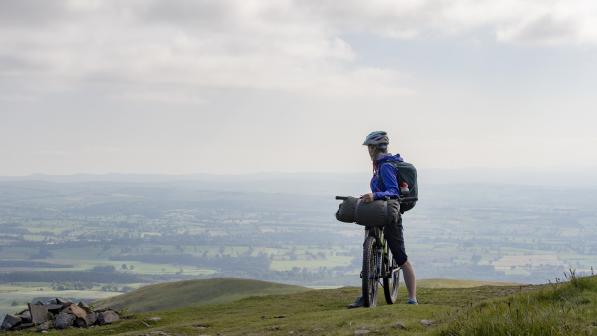Campaign win: Natural England to consider opening next National Trail to horse riders and cyclists

- Only two of 16 national trails in England are rideable along their entire length
- Multi-user route will increase trade and opportunities for rural accommodation and hospitality sector
- Organisations propose a braided route, which would allow cyclists and horse riders to ride the length and contribute to rural tourism economy
The Department for Environment, Food and Rural Affairs (Defra) and Natural England are to reconsult on plans for the new National Trail, Wainwright’s Coast to Coast trail, which could make it accessible for people cycling and horse riding, after Cycling UK and The British Horse Society (BHS) threatened legal action.
Currently only two of the 16 National Trails in England can be ridden in their entirety, the South Downs Way and the Pennine Bridleway.
Previous proposals for the popular trail, which stretches from St Bees in Cumbria to Robin Hood’s Bay in North York Moors National Park, used a combination of footpaths, which horse riders and cyclists cannot use, and bridleways, which they can.
This would have created dead-end sections along the route for anyone on a horse or cycle, effectively preventing people from riding its length.
The two organisations believe a ‘braided’ route, which would divert horse riders and cyclists from the main walking route where suitable, can be achieved for minimal cost, and await clarification from Defra and Natural England about timescales and processes for the new consultation.
The Wainwright path is a fantastic attraction for the north of England, and as a National Trail its benefit will be felt by all the rural communities it passes through. Making it accessible to cycling and horse-riding enthusiasts will mean it’s open to more visitors
Duncan Dollimore, Cycling UK’s head of campaigns
This has been possible on other popular National Trails such as the unofficial North Downs Way’s riders’ route launched in 2018 with the support of the National Trail itself, Cycling UK and the BHS.
Natural England and Defra failed to consult with Cycling UK and the BHS during the initial consultation phase of the new National Trail. This is despite both organisations being prescribed outdoor user groups which should be consulted on changes to rights of way.
On this basis, the two organisations wrote to the previous Secretary of State for Defra, the Rt Hon Ranil Jawawardena MP, calling on the government to reconsider the proposals for the route as Natural England had failed to consult appropriately.
Duncan Dollimore, Cycling UK’s head of campaigns, said:
“Cycling UK and the BHS are relieved the government has now recognised the concerns our organisations raised about the exclusion of outdoor enthusiasts we represent from a new National Trail.
“The Wainwright path is a fantastic attraction for the north of England, and as a National Trail its benefit will be felt by all the rural communities it passes through. Making it accessible to cycling and horse-riding enthusiasts will mean it’s open to more visitors.
“If you ride a bike or a horse, you can use only 22% of England’s rights of way network or ride two out of 16 of our National Trails. We need to do more to increase access, not limit it. The benefits are real for rural hospitality businesses, which will see increased trade from a more diverse group of visitors.”
Research by Cycling UK has found cycle tourism in the UK generates £520m per year, with 1.23 million overnight trips each year. A recent survey of riders of King Alfred’s Way, a route starting in Winchester that Cycling UK launched in 2020, showed that on average cyclists spent £83.60 per day on food and accommodation.
The Trans Pennine Trail 2022 visitor survey also found that while the daily spend of trail users was £44.41 per person; for horse riders it was £84.98.
Mark Weston, the BHS’s director of access, said:
“As vulnerable road users, horse riders face considerable dangers on our roads and the need for safer off-road riding opportunities has never been greater. The British Horse Society and Cycling UK look forward to working with Defra and Natural England to make the trail useable for horse riders and cyclists in its entirety.”
Defra announced on 12 August 2022 that £5.6 million would be allocated to improve the 197-mile Wainwright’s Coast to Coast route, ahead of it becoming a National Trail in 2025.
The British Horse Society and Cycling UK look forward to working with Defra and Natural England to make the trail useable for horse riders and cyclists in its entirety
Mark Weston, the BHS’s director of access
Stu Price, owner of Dales Bike Centre which sits on proposed route for Wainwright’s Coast to Coast, welcomed the potential for making the route open to cycling, saying:
“Making the Wainwright’s Coast to Coast a National Trail that is open to mountain bikers is a win for business and a win for people looking to holiday in the UK, and will help make the route more accessible for more people.
“You’ll ride through three of most amazing National Parks in England over the course of four to five days, and everywhere riders stop to stay or take refreshment will benefit.”
Mark Sandamas, owner of Coast to Coast Packhorse based in Kirkby Stephen which provides holidays and services along the route, said:
“We’ve had a number of people who walk the route one year, and return the next to ride it – it’s a true icon of the north. Anything that attracts more people to the C2C will benefit the hospitality businesses along the route, and making it more accessible for cycling will do just that and should be welcomed.
“The Wainwright’s Coast to Coast is a clear walking route, though, so I’m pleased to hear propositions from Cycling UK and the BHS are for a braided route which will look to minimise conflict and potential damage to the landscape, while allowing everyone to enjoy the trail.”
ENDS
Notes to editors
- Cycling UK, the UK’s cycling charity, imagines a world where the streets are free of congestion and the air is clean to breathe, where parents encourage their children to cycle to school and everyone shares the exhilaration of being in the saddle. For more than 140 years, we’ve been making our streets safer, opening up new traffic free routes and inspiring more people to cycle more often. www.cyclinguk.org
- As the largest equine charity in the UK, The British Horse Society is dedicated to education, equine welfare, protecting and increasing access to bridleways and places to ride and carriage drive off road, and safety for horse and riders. The society’s thriving and active community of staff and volunteers is committed to improving the lives of horses everywhere. Visit bhs.org.uk to learn more.
- Government announcement on launch of Wainwright’s Coast to Coast being granted National Trail status: https://www.gov.uk/government/news/new-national-trail-status-awarded-for-popular-coast-to-coast-route
- Cycle tourism spending from cyclists in the UK generates £520m per year. There are 1.23 million overnight trips each year, benefiting small businesses in particular, and these contribute £433m to the economy. A survey of riders of King Alfred’s Way, a route starting in Winchester which the charity launched in 2020, shows on average every cyclist spends £83.60 per day on food and accommodation https://www.cyclinguk.org/sites/default/files/document/2020/07/benefits_of_cycle_tourism_factsheet_final10738.pdf
- People horse riding and cycling can only ride the lengths of two of the 16 National Trails, the South Downs Way and Pennine Bridleway. In 2018, Cycling UK and the British Horse Society worked with the North Downs Way National Trail to create an alternative ‘riders’ route’.
Press contact information
For more information, please contact the national Cycling UK press office vial email [email protected]. Out of hours, call 07786 320 713

